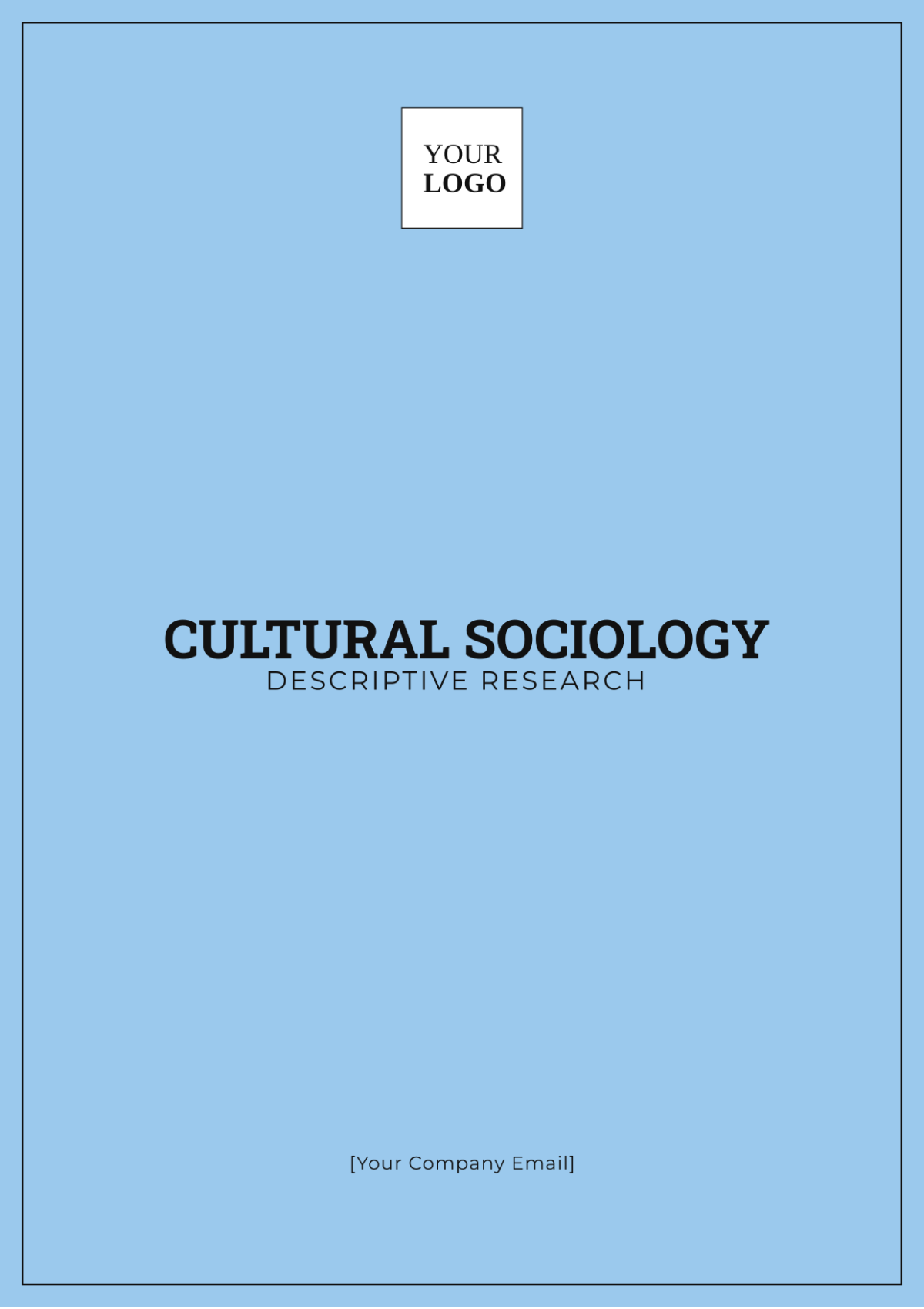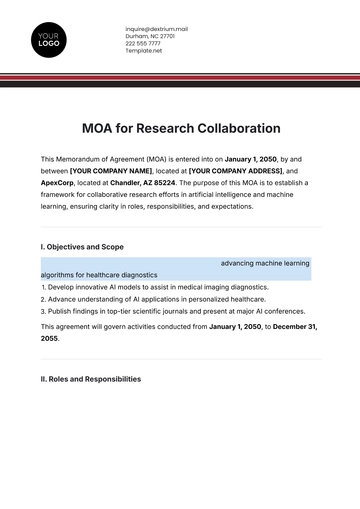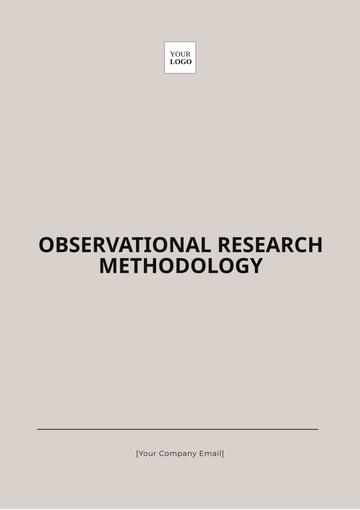Free Cultural Sociology Descriptive Research

Researcher: [Your Name]
Date: [Date]
I. Introduction
Cultural sociology descriptive research is a comprehensive study designed to provide an in-depth portrayal of cultural practices, norms, and values within a specific society or community. This research aims to observe and document how cultural elements are expressed and experienced in everyday life, and how they shape the interactions and perceptions of individuals and groups. By examining the intricate web of cultural phenomena, this study seeks to uncover the underlying processes that mold societal behaviors and structures, offering valuable insights into the dynamics of cultural continuity and change.
II. Literature Review
Geertz (2050):
Defines culture as a system of inherited conceptions expressed through symbolic forms.
Highlights how individuals use these symbolic forms to communicate and develop their understanding of life.
Bourdieu (2051):
Elaborates on the concept of habitus.
Emphasizes how ingrained habits and dispositions influence cultural practices and societal interactions.
Turner (2050):
Extensively studies rituals.
Reveals their significance in reinforcing social bonds and cultural identity.
Sapir (2052):
Highlights the role of language in shaping cognitive processes and social relationships.
Appadurai (2054):
Examines the effects of globalization on local cultures.
Illustrates the tension between global influences and traditional practices.
III. Methodology
This study employs a qualitative research methodology, utilizing observational techniques to gather data on cultural practices, norms, and values.
III.I Data Collection Methods
Participant Observation: Researchers immerse themselves in the community to observe cultural activities and interactions in their natural context. This method allows for a deep understanding of cultural practices as they occur in everyday settings.
In-depth Interviews: Both structured and unstructured interviews are conducted with community members to gather nuanced perspectives on cultural norms and values. These interviews provide a richer understanding of individual experiences and interpretations.
Document Analysis: Researchers review cultural artifacts, including literature, media, and historical documents, to gain insights into the symbolic meanings and historical contexts of cultural practices.
III.II Sampling
The study focuses on a specific community, employing purposive sampling to select participants who possess extensive knowledge or experience with the cultural practices under investigation. This targeted approach ensures that the research captures a broad range of perspectives and insights from those deeply embedded in the cultural context.
III.III Data Analysis
Data analysis involves thematic analysis to identify recurring themes and patterns within the collected data. This method enables researchers to extract meaningful insights and construct a comprehensive understanding of the cultural phenomena under study. Themes are categorized based on their relevance to the research questions and objectives.
IV. Discussion
The research findings will offer a nuanced understanding of how cultural norms and values shape the daily lives of individuals and groups. For example:
Rituals: Observed rituals can provide insights into collective beliefs and the mechanisms that sustain social cohesion and identity. The study will analyze how these rituals function within the community and their role in reinforcing cultural continuity.
Language Use: The study will explore how language reflects power dynamics and social hierarchies within the community. Analyzing language patterns can reveal underlying social structures and cultural attitudes.
Globalization Impact: By examining changes in cultural practices over time, the research will assess how globalization influences local traditions and practices. This analysis will highlight the adaptive strategies employed by the community to preserve cultural integrity amidst external pressures.
The discussion will integrate these findings with existing theories and literature, providing a broader context for understanding the resilience and adaptability of cultural practices. This integration will illuminate how communities navigate and negotiate cultural change in response to global and local influences.
V. Conclusion
Cultural sociology descriptive research provides a detailed examination of cultural practices, norms, and values within a specific community. By documenting and analyzing these elements, the study offers valuable insights into the ways they shape societal structures and individual behaviors. This research underscores the importance of understanding cultural dynamics to appreciate the complexity and richness of human societies. It highlights the need for continued exploration of cultural phenomena to better grasp the evolving nature of cultural identities and practices in a rapidly changing world.
VI. References
Appadurai, A. (2054). Modernity at Large: Cultural Dimensions of Globalization. Minneapolis: University of Minnesota Press.
Bourdieu, P. (2051). Distinction: A Social Critique of the Judgement of Taste. Cambridge, MA: Harvard University Press.
Geertz, C. (2050). The Interpretation of Cultures. New York: Basic Books.
Sapir, E. (2052). Language: An Introduction to the Study of Speech. New York: Harcourt, Brace & Company.
Turner, V. (2050). The Ritual Process: Structure and Anti-Structure. Chicago: Aldine Publishing.
VII. Appendices
Appendix A: Interview Guide: Includes a structured set of questions used during the in-depth interviews, designed to elicit detailed responses about cultural practices and norms.
Appendix B: Observation Checklist: A list of cultural practices and activities observed during fieldwork, including specific events, rituals, and daily routines relevant to the research.
- 100% Customizable, free editor
- Access 1 Million+ Templates, photo’s & graphics
- Download or share as a template
- Click and replace photos, graphics, text, backgrounds
- Resize, crop, AI write & more
- Access advanced editor
Investigate cultural dynamics with ease using Template.net’s Cultural Sociology Descriptive Research Template. This customizable and editable template is ideal for sociologists conducting in-depth cultural studies. Tailor it to your specific research needs using our AI Editor Tool, ensuring thorough documentation and analysis of cultural behaviors, traditions, and social patterns. Perfect for producing insightful and comprehensive cultural research.





























